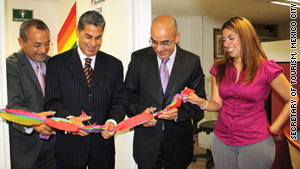Mexico City woos same-sex honeymooners
- The first couple to wed under Argentina's new same-sex marriage law arrives this week
- A new government tourism office in Mexico City aims to attract more gay visitors
- Officials hope the city will become the top destination for gay travelers in Latin America
- Professor: Latin America has some of the most gay-friendly cities in the developing world
Mexico City, Mexico (CNN) -- As more governments approve same-sex marriage laws, officials here are hoping to attract a growing part of the tourism market: gay honeymoons.
The first couple to wed under Argentina's recent law allowing same-sex marriages nationwide arrives in Mexico this week on an all-expenses-paid trip -- part of a new push by the government in Mexico City, Mexico to woo gay travelers.
"We hope that many same-sex couples who get married around the world spend their honeymoons here," says Alejandro Rojas, the city's tourism secretary.
In July, the city opened an office aimed at catering to gay tourists that officials describe as the first of its kind in Latin America.
"We are a very tolerant, liberal, avant-garde city," Rojas says.
Officials inaugurated the new office by cutting a rainbow-colored ribbon. Rojas said the office's goal is to make Mexico City the No. 1 gay-friendly destination in Latin America.
"Mexico has a tradition of being a rather macho culture... This is a sign of a very important social change," says Argentinean architect Jose Luis David Navarro, who will be spending part of his honeymoon in Mexico City this week.
The city's tourism secretary called to congratulate Navarro and his husband soon after they wed in northern Argentina in July.
For years, it was rare to see gay rights issues gaining traction in Mexico and other Latin American countries.
Not anymore, according to Javier Corrales, a professor of political science at Amherst College in Massachusetts.
"Latin America currently has some of the most gay-friendly cities in the developing world," says Corrales, who ranks cities' gay-friendliness in a new book he co-edited, "The Politics of Sexuality in Latin America."
Homosexuality remains a divisive issue in much of Mexico, with conservative politicians pushing for laws banning same-sex marriage in many states after Mexico City approved a gay marriage law last year.
The country's Roman Catholic Church leaders have been vocal opponents of the Mexico City law, which took effect in March and also allows married gay couples to adopt children.
But Mexico City officials say they hope to set a strong example that the rest of the country will follow.
Project plans for the new gay tourism office are still in the works.
In addition to training local hotels and restaurants on how to be sensitive to gay clientele, officials say they hope to create maps of the city highlighting attractions for gay tourists and possibly host an international gay tourism conference.
Hotels, restaurants and businesses in Mexico City have responded positively to the program so far, Rojas said.
So many sponsors offered to chip in for the Argentinean couple's free honeymoon that the city government didn't have to contribute any funds.
The annual economic impact of lesbian, gay, bisexual and transgender travelers is about $63 billion in the U.S. alone, according to Community Marketing, Inc. of San Francisco, California. On the global scale, Rojas says, that number is even greater.
"Around the world, it is a very important market," Rojas says.
Gay tourists represent 15 percent of the world's tourism market, and they spend more money than heterosexual tourists when they travel, he says.
Recognizing the commercial value of gay tourism is a positive step, Navarro says, but it also shows that more social change is needed.
"I hope that there comes a day in the future when they don't have to have an office for gay tourists, just like there isn't an office for Asian tourists," Navarro says.
But for now, he says, he and his husband are looking forward to the chance to visit Mexico City for the first time.
"Our suitcase is already packed," he says. "After 27 years of happiness together, this is the icing on the cake."

